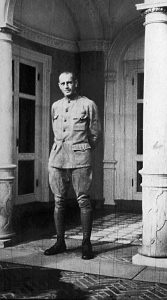February 1917 – Preparation for War
February 3, 1917, had dawned cold and miserable in Boston. The thermometer hovered around zero and there was a biting wind. It was a day to stay home. Bessie McKee and her companion Estelle Clements remained indoors contemplating the implications of the day’s momentous news: President Woodrow Wilson had just announced to Congress that the United States had severed diplomatic relations with Germany. Two days earlier, Germany had announced that it was reintroducing unrestricted submarine warfare on both belligerent and neutral shipping. In Washington, Count Johann von Bernstorff, German Ambassador to the United States, was advised of the diplomatic break and told to leave immediately; and James Gerard, the American Ambassador to Germany, was summoned home. The scene was set for hostilities. Even the weather seemed hostile – more heavy snow, high winds, thunder, and lightening. The Old South, Bessie’s church, presented a sermon that Sunday on the duty of the United States to always stand for freedom, “a fine call to patriotism,” wrote Estelle in her diary.

George Lyon in uniform
In response to the belief that their country would soon be joining the war, Bessie and Estelle immediately signed up for “Surgical Dressings” gatherings at the church, as well as joining the Fragment Society, an early form of women’s activism whose mission was to apply women’s nurturing values to the world’s problems. They attended lectures on Americanization, the British Navy, and Russia. Estelle went to the Peter Bent Brigham Hospital to offer her help and came home with 180 yards of bias bandages to roll. American women everywhere began knitting socks, gloves, and hats for the soldiers who would soon leave for Europe. Augustine (who was only 18 years old at the time) enrolled in “Preparation & Service In Case of War.” Her service took the form of learning motor repair and wireless telegraphy – a far cry from her recent debutante activities!
Marjorie and George were on vacation in Hawaii, but they managed to book immediate passage on the S.S. Matsonia to return to the United States so that George could be ready for his call to service. “The Matsonia is crowded to capacity as a result of the breaking off of diplomatic relations,” wrote Marjorie. “There was a rush for accommodations as soon as the possibility of war and its meaning was realized.”
On April 6, 1917, America formally declared war on Germany, joining Britain. For the next two years Pardees, Van Wickles, and Lyons would go all over the United States and Europe to serve their country in the Great War.
